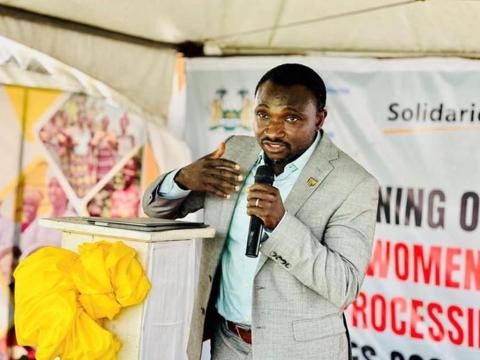By Mabinty M. Kamara
As the planting gets underway in Sierra Leone, the agriculture and food security minister has moved to lower expectations about the ability of the Feed Salone initiative to make this country self-sufficient in food in the near future.
Dr. Henry Kpaka who has been on a whirlwind tour of all major rice producing areas recently said in a lengthy statement widely circulated on social media called for “concentrated and sustained investment from both the government and the private sector” in the government’s Feed Salone programme which aims to “reduce rice importation by 20% annually”, reaching near zero by 2028.
Kpaka said for the people of Sierra Leone to focus on the reduction on the cost of the staple under Feed Salone is “a distraction”, noting that the project must “attract local farmers and investors into rice production”, for it to succeed and that “government that makes low rice prices an explicit objective should be prepared to subsidise local rice production for the long haul heavily. The subsidy must include internal and external cost drivers”.
Kpaka said after visiting and having “discussions with rice processors and millers nationwide, I understand that their primary concern is boosting profitability within the rice value chain. We cannot, on the one hand, nudge farmers and investors to the rice value chain, and on the other, have an explicit objective around low prices”.
The minister said “Feed Salone does not have an explicit price objective because guaranteeing low rice prices would rely on a large government subsidy program which we find inefficient.
Our approach relies on attracting the private sector in the value chain. With more competitive actors, rice production will rise, and the efficiency gains will begin to put downward pressure on some of the costs of production, which will ultimately affect the price of rice in the market”.
The Food Security Minister said even when Sierra Leone achieves self-sufficiency in rice; the cost of the commodity will still be a fact including, first: “the yield and overall productivity of the rice value chain, which encompasses the efficiency and output of our agricultural practices. Second, the production costs include the cost of seed rice, the fuel required for operating tractors and harvesters, the price of fertilizers and agrochemicals, milling costs, transportation expenses, and the wages for labour”.
He noted that what he called the “cost-driving factors” are not within the control of the government but that the government introduced “policies to create a market for local rice, and to encourage backward integration from rice importers. In collaboration with our partners, the government has also introduced a credit facility at a 10% interest rate, significantly lower than the market rate of over 30%, to stimulate private investment in the space”.
The minister also noted that Sierra Leone boasts of ideal ecological conditions for rice cultivation, having “no business to import rice” but the World Food Program says over one million Sierra Leoneans are acutely hungry.
Many Sierra Leoneans we spoke to described the minister's article as "frank" but that he has no choice but to succeed in one of president Julius Maada Bio's key pledges in his big five political agenda for this second term.
Copyright © 2024 Politico Online (08/04/24)








